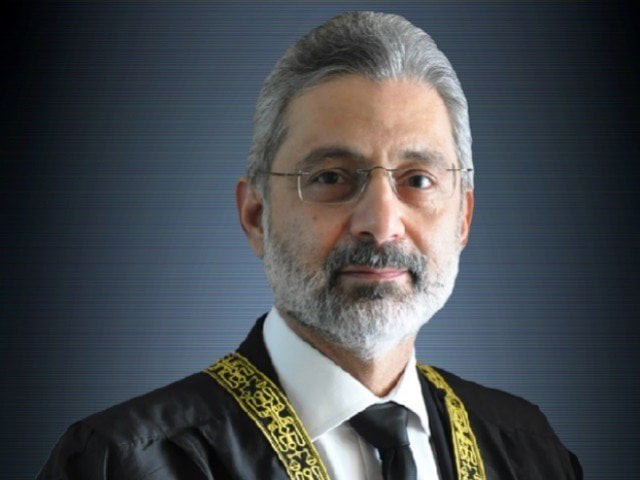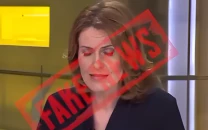AGP questions Justice Isa’s stance
Hearing adjourned till tomorrow in Justice Qazi Faez Isa case

Justice Qazi Faez Isa. PHOTO: FILE
“What is surveillance and whether seeking information of undisclosed wealth amounts to surveillance,” said the AGP in his written formulations submitted before the 10-judge full court led by Justice Umar Ata Bandial.
A day earlier, Justice Isa in his written synopsis submitted in the apex court had contended that the information gathered against him and his family to file a presidential reference was collected through “covert surveillance” by using “unlawful means”.
“Surveillance of a judge and his family is not envisaged under this law, therefore, all those who did so are now liable for criminal prosecution which this court may be graciously pleased to order,” said the SC judge.
He had requested the apex court to quash the reference along with the proceedings before the Supreme Judicial Council.
Last year in May, a presidential reference was instituted against Justice Qazi Faez Isa accusing him of concealing his properties in the United Kingdom, allegedly held in the name of his wife and children.
The judge subsequently wrote three letters to President Arif Alvi, which were eventually leaked to the media, asking him to confirm whether the reports were true.
The judge complained that selective leaks of the reference to the media amounted to his character assassination, thus jeopardising his right to due process and fair trial.
During the hearing on Tuesday, the AGP asked “If the reference before the Supreme Judicial Council (SJC) was a trial or an issue placed before the peers of the judge for investigation and inquiry.
“The executive does not get involved in the inquiry against a judge so that the principle of independence of the judiciary is maintained.”
The AGP said it was up to the SJC to determine whether Justice Isa’s actions fell under the purview of misconduct or not.
Khan contended that after the submission of reply over the show cause notice issued by the SJC, the judge’s constitutional petition was not maintainable.
“The level of honesty and law abidingness expected by a judge is more than that of an ordinary citizen,” he said.
He questioned Justice Isa’s stance saying the SC judge had admitted that the properties in the United Kingdom were owned by his wife and children and then he had filed a petition to quash the presidential reference on technical grounds.
The AGP requested the SJC to conduct an inquiry to confirm if the properties were purchased with Justice Isa’s money.
The court asked the attorney general to explain how the evidence against the top court judge was collected and legality of the procedure.
When the AGP cited the presidential reference which stated that Justice Isa had violated Section 116 of the Income Tax Ordinance 2001 by failing to disclose properties owned by his family members on his wealth statement, Justice Bandial observed that the violation had already been thrashed out by the petitioner and directed Khan to relay other obligations.
During the hearing, an unpleasant scene was also witnessed when the AGP passed unwarranted remarks regarding some members of the full-court.
The bench strongly reacted to the comments after which the AGP withdrew his statement. The court directed the media to refrain from quoting the AGP comments.
The hearing of the case was adjourned till Wednesday (today).
The presidential references
In May 2019, a presidential reference was filed in the Supreme Judicial Council against Justice Isa alleging non-disclosure of assets in his wealth statement.
In his reply, the top judge maintained that he was neither answerable for the assets of his wife nor adult offspring nor was he under obligation to disclose any information concerning them.
Challenging the allegation, Justice Isa said the presidential references are filed under “malice, ulterior motives and to achieve a collateral purpose and to humiliate, subjugate and browbeat the judiciary, destroy the judiciary’s independence and make the judiciary subservient to the executive by subverting the Constitution.”
In his constitutional plea, Justice Isa also sought a stay in the SJC proceedings against him till the matter was decided in the top court.
In another petition seeking a full-court, Justice Isa had underscored that the ‘possibility’ of the judge being swayed over a personal advantage is a ground for recusal under Article 4 of the Code of Conduct of Judges of the Supreme Court and the High Courts of Pakistan. Consequently, Justice Masood and Justice Ahsan recused themselves from the bench.


















COMMENTS
Comments are moderated and generally will be posted if they are on-topic and not abusive.
For more information, please see our Comments FAQ